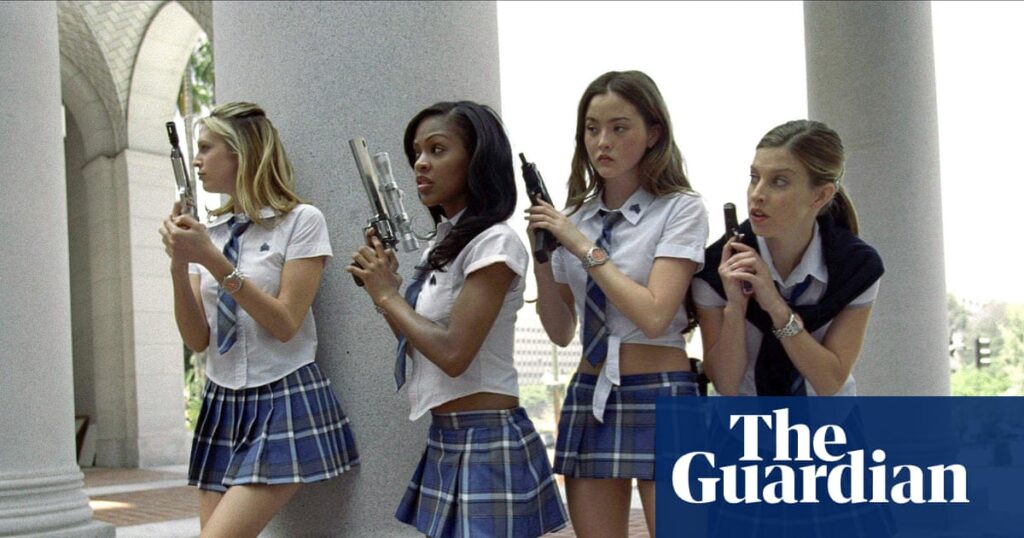“Are you kidding me?” snaps Ms Petrie, Holland Taylor’s power-suit loving intelligence chief, towards the end of the 2004 spy satire DEBS. “We conduct a nationwide manhunt for you, and you’re boning the suspect?!”
In a nutshell, this is the basic premise of Angela Robinson’s 2004 debut feature film, a critically panned box office flop which has transformed into a cult classic over the last 20 years thanks to its refreshing and cheery nonchalance towards the subject of sexuality. The heavily sanitised trailer, which erased virtually all evidence of a sapphic storyline, meant that DEBS passed me by for years. Now, I’m making up for lost time.
Though DEBS is far from being the first film to explore queerness through the lens of a criminal caper – bank heist thriller Set It Off, gory noir flick Bound and David Lynch’s classic Mulholland Drive all beg to differ – Robinson’s take on a longstanding trope stands out for its distinct lack of grit or peril. It is also an outlier compared with other, more lighthearted lesbian films of the same era. While more traditional romcoms such as Imagine Me and You and Saving Face also attempted to shift the dial, the shame and inner turmoil of their closeted lead characters wrestling with forbidden desires still provided much of the narrative thrust. And while Jamie Babbit’s equally tongue-in-cheek But I’m a Cheerleader has the most obvious similarities, that satire hinged on something much darker and more sinister, parodying the very real harm caused by gay conversion practices.
DEBS, on the other hand, remains strangely notable to this day, for simply being a silly, over-the-top, low-stakes noughties thriller that just so happens to have some lesbians in it.
Released the year after Charlie’s Angels gaudy, willfully silly sequel Charlie’s Angels: Full Throttle, DEBS put an even campier spin on the other high-octane thrillers that dominated in that era. The story centres on a group of teenage spies who have been handpicked for a life of paramilitary espionage on the strength of their high school SAT scores. Much like a pack of Fame Academy hopefuls, the gang live all together in a sorority-styled house and fight against organised crime, all while wearing tiny plaid skirts that help them to resemble extras from Britney Spears’s Baby One More Time music video. Their commander-in-chief, Ms Petrie, turns up frequently as a hologram to deliver classified briefings in the middle of the school canteen. Dominique, played by Devon Aoki, speaks in a farcical French accent, and permanently has a cigarette hanging out of her mouth, and a new man in her bed.
Everything is going smoothly enough until a new sighting of DEBS’ terrifying arch-nemesis Lucy Diamond – a murderous supervillain with impeccable eyebrows and a thirst for bloodshed. Details on her origin story are amusingly thin – a bad breakup and an insatiable hatred for Australia are both alluded to – but one thing is even clearer than the girls’ super-reflective lip gloss: she must be stopped. And who better to defeat her than DEBS’ resident goody-two shoes, Amy Bradshaw – who is writing an entire thesis delving into Lucy Diamond’s warped inner psyche.
There’s just one problem – Amy isn’t just concealing state secrets. She’s also lying to herself about who she really is, though the tofu scramble she orders for breakfast is a brilliantly on-the-nose hint about where things are headed. Once Amy learns that Lucy is into women after a failed stakeout of her terrible blind date with Russian assassin Ninotchka Kaprova, her fascination with the enemy only builds. Ultimately, our hero and villain end up running away together, faking Amy’s kidnap in order to head off on an extended romantic romp.
While her friends obviously feel betrayed at first – her fellow DEB Janet scathingly labels her a “gay slut” after uncovering the scheme – they ultimately conspire against the government to help them flee and find happiness. Amy’s journey of self-discovery may come about through highly unusual means, but her coming-out story is a largely joyful one, and her sexuality is barely a source of plot tension.
Though it’s certainly possible to read Amy’s propensity for lying as a deeper metaphor for concealed queerness, doing so would probably mean taking DEBS far too seriously. Here, things are simply not that deep, and 20 years on from its release, there’s still nothing else quite like it.

